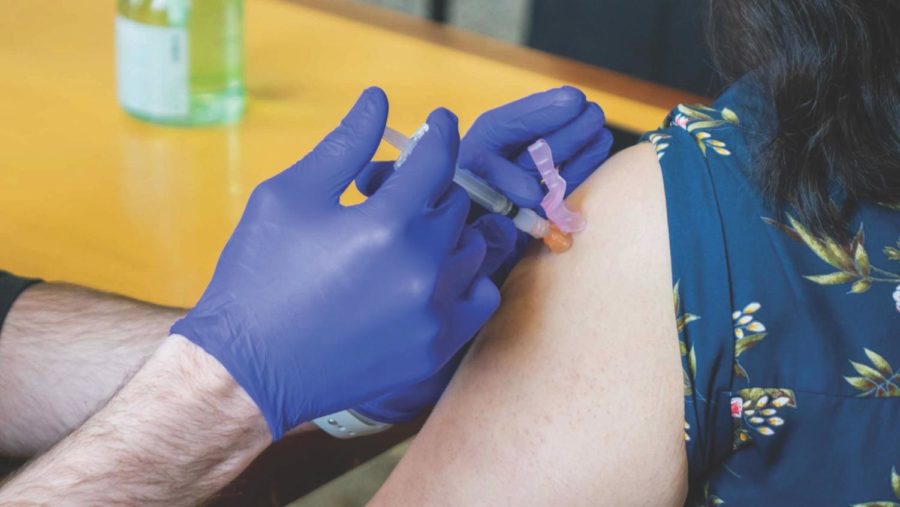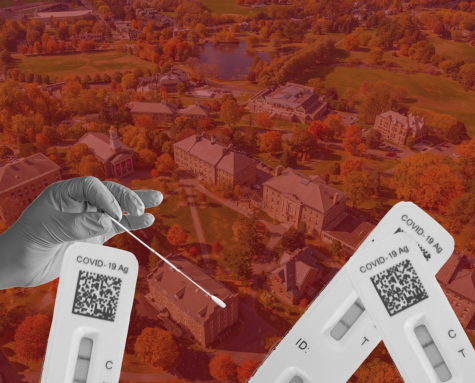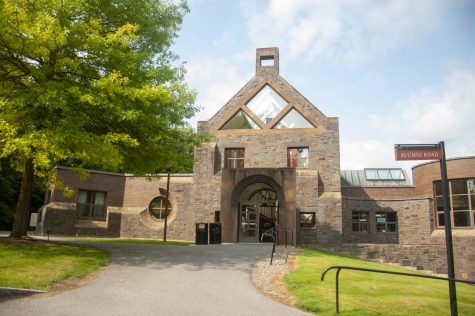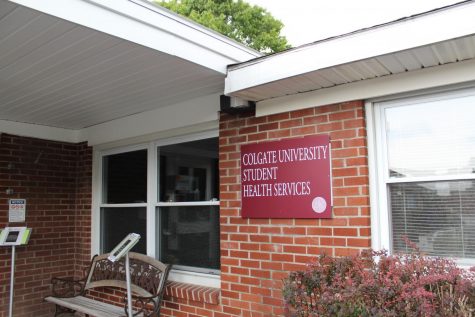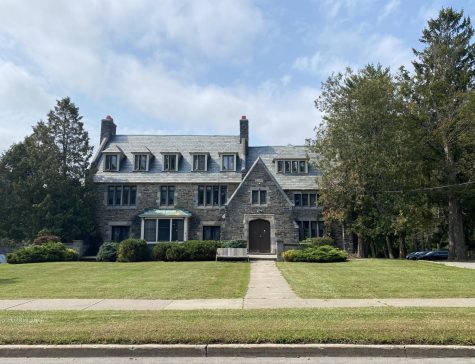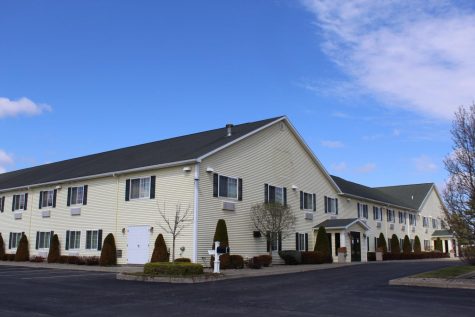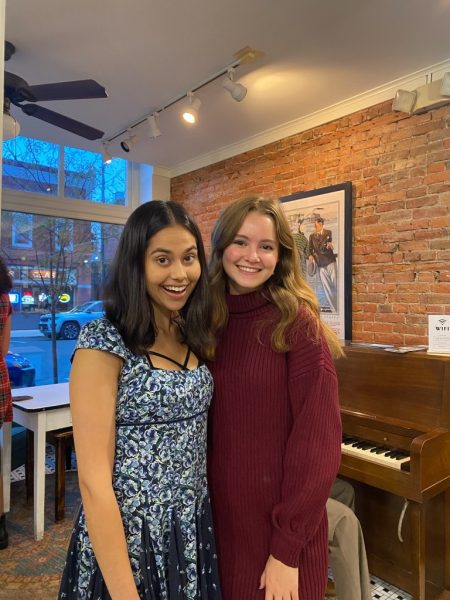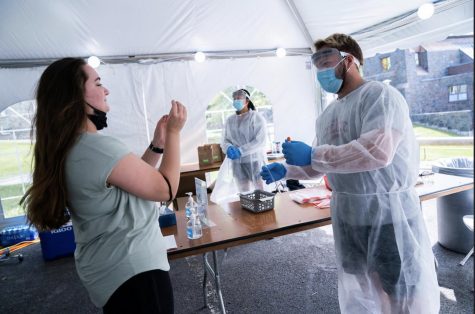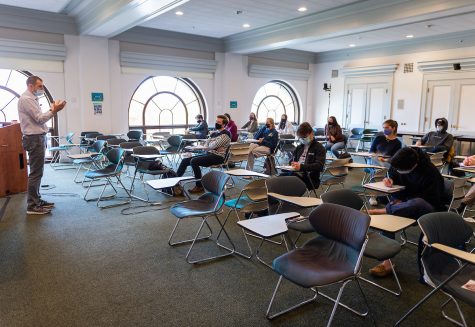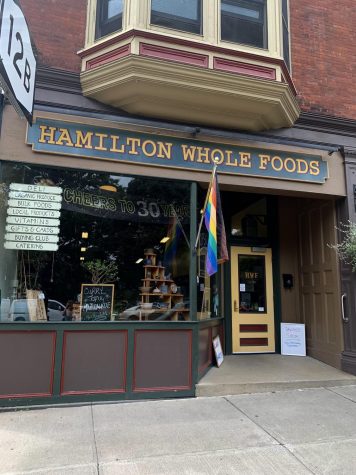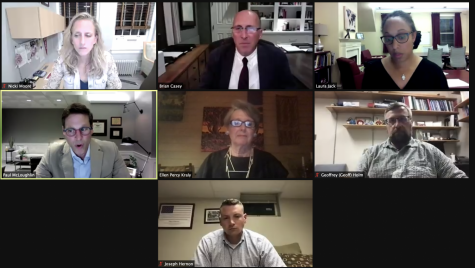COVID-19 Vaccine Becomes Available to Student Body
With the FDA’s authorization of three COVID-19 vaccines for emergency use, some eligible members of the Colgate community have begun to get vaccinated.
N.Y. State is currently vaccinating those eligible under Phase 1A and 1B of its phased distribution plan. Gov. Andrew Cuomo announced Monday that adults 30 years or older would be eligible as of Tuesday, March 29 and that all adults would be eligible for vaccination on April 6.
Junior Heather Knobel received her first dose of the two-dose Pfizer-BioNTech vaccine on Feb. 7.
“I am from Illinois and I don’t qualify for the vaccine in Illinois based on the screening questions and the Illinois standards,” Knobel said. “But I do qualify in New York because I do have a blood disorder. One of the screening questions that they do ask is if you have a bleeding disorder, and I do.”
After confirming with her doctor that she was eligible and obtaining a doctor’s note, Knobel drove to the Syracuse Exhibition Center and received the vaccine.
“Coronavirus is a super dangerous virus, so I wanted to do what I could to protect myself and others,” Knobel said. “I was excited. I was a little nervous just because of all the people around in the exhibition center, but it was definitely a really exciting time to be one of those people who has been vaccinated.”
After hearing from friends that vaccine appointments were available online, senior Audrey Cussen went on the Walgreens website and made her vaccination appointment. As a Sports Medicine Student Assistant for Colgate’s Men’s Football team, Cussen was eligible as a healthcare worker under NYS phasing.
“I really didn’t know anything about getting the vaccine,” Cussen said. “I live in Los Angeles part-time, and the vaccination regulations there are pretty strict especially… I just assumed it was the same thing up here. But I checked my eligibility and it said that I am eligible, and I pretty much just booked it.”
In her March 12 Colgate Digest email to the student body, Vice President for Communications Laura Jack reported that Phase 1B of vaccine distribution in N.Y. included all in-person college faculty and essential in-person staff.
“If you are a faculty member, staff member, or student employee working in any campus department, you qualify under this new guidance,” Jack wrote in her email.
Associate Vice President for Campus Safety, Environmental Health and Emergency Management Dan Gough explained that after a change in the language of which college employees were eligible, Colgate staff contacted Madison County Department of Health to determine whether student employees could actually be vaccinated.
“They actually changed the language on in-person instructors for higher ed, which qualified, and added essential personnel. The interpretation for that by Cornell [University] and Syracuse [University] was that it applied to all employees, so we contacted Madison County Department of Health to see if all employees did indeed qualify,” Gough said. “They responded that as long as they were in an in-person status, they were considered essential.”
Later the same week, Gough announced free, University-provided transportation for Colgate students to local vaccination sites at the Hamilton Masonic Lodge and SUNY Morrisville.
Many students who are not yet eligible have also been able to receive vaccines off of waitlists. By placing themselves on lists with local pharmacies and distribution sites, students have been able to get unused doses that would otherwise have been thrown away.
Gough said that the length of a two-dose vaccination series makes it unlikely that an increasingly vaccinated community would lead to a change in on-campus operations this semester.
“It would be very unlikely that we would change anything else at this point just based off vaccination because the majority of our community population getting vaccinated in the next couple of weeks for their first dose means their second dose and that two weeks period after that brings us through commencement,” Gough said.
Student Health Services and the Emergency Operations Center launched a confidential survey on Friday, March 19 to understand the vaccination status of Colgate community members.
Gough reported that after its initial launch in Jack’s digest email, the survey received slightly more than 400 responses. A few more responses were submitted after a communication on Monday, March 22, but Gough said he hopes for better data once a targeted communication is sent to on-campus students and employees who have not yet completed the survey.
“This is an optional survey,” Jack wrote in her email, “but it’s quick, easy, and helpful as we make plans for our return to normalized operations this fall.”
CONGREGATE LIVING DEFINITION CAUSES CONFUSION
While not eligible by the standards of N.Y. State at this time, many Colgate students were able to receive their first dose at various local vaccination sites. During the week of March 8, rumors around campus led many students to believe that they were eligible to be vaccinated because of their living environment. On the online N.Y. State “Am I Eligible” tool, N.Y. State residents who currently live in a “congregate setting” are deemed eligible.
After getting texts from friends saying she was eligible to be vaccinated because of her living situation, Claire* began to do her own research.
“It seemed kind of ambiguous,” Claire said. “I wasn’t too sure about it, and this was the very first day they’d announced it, this was before Colgate had said anything. So, I went on the website to register for the vaccine, and I went through the steps and it said I was eligible.”
Claire lives off-campus, in what she described as one house with many groups within it. After seeing she might be eligible online, she called the N.Y. State COVID-19 Vaccination Hotline.
“I was on the phone with them for a while, and I didn’t get a super clear answer. My main question was mostly about whether or not I was considered a New York resident and was allowed to get the vaccine in New York,” Claire said. “He reaffirmed that basically if I lived here primarily, I was eligible to get the vaccine in New York. Under the congregate housing, he wasn’t as concrete on it, and I talked to his supervisors a few times and he couldn’t give me a clear answer but said he thought I was eligible.”
Claire said she hoped for an appointment the following week, but when an appointment availability popped up for the same afternoon, she seized the opportunity. She had her landlord sign a note confirming her housing situation and drove to Utica.
Benjamin*, who lives in a Colgate townhouse, was also able to be vaccinated after claiming he lives in congregate housing.
“I heard through the grapevine that… inside the Townhouses, a lot of people were getting their vaccines. They were going to different websites… and they gave you a couple options [like] if you’re like 65 and older or if you’re living in congregate housing,” Benjamin said. “It kind of got to everyone that you can get the vaccine with congregate housing, and so I thought since I do live in technically congregate housing I thought [I would sign up], and I was able to get my vaccine.”
Congregate living refers to “nursing homes, group homes for those with developmental or physical disabilities, inpatient mental health care facilities, group homes and foster care, and addiction services,” as Jack listed in a March 9 email that clarified students are not eligible to be vaccinated because of their living environment. By this time, some students had already made their appointments or gotten their first dose.
Gough said he soon became aware that a lot of students were receiving the vaccine under the misinformation that they qualified under congregate living.
“I don’t think anyone was doing that maliciously or with mal intent or nefariously, I think they just didn’t understand that, having not read closely on what congregate living was defined as,” Gough said.
Benjamin said he thought his 16-person townhouse fit the definition of congregate housing.
“If one of these 15 other people were to get COVID[-19], I would probably get it,” Benjamin said. “So, I think it makes sense that I would be applicable for it. I guess at the end of the day we technically were not, and it was meant to be for other people living it different types of congregate housing. But I fully was convinced that I was allowed to do it.”
Claire said she was 80 percent confident that she was eligible.
“I also kind of saw it as not too different from getting on the waitlist because it was opening that opened up for that day, like an hour before,” Claire said. “But I would not have gone and gotten it if they had sent that email out before I had gotten vaccinated. I was acting under the assumption that what I was doing was right.”
Claire and Benjamin went to different vaccination locations to receive their doses, but both said that neither location asked for proof of their eligibility.
After using her passport and lease agreement to confirm her N.Y. State residency, Claire said she was asked how she was eligible, to which she replied “group housing.” She said that the staff did not ask for nor look at any further documentation.
“I think technically they want other proof. I think the woman I was with just didn’t really care [or] look closely. I’ve heard that from all my friends that have gotten vaccinated,” Claire said. “[Students have] done a very good job of making sure they have all the proper documentation and stuff like that, and I’ve heard resoundingly from all the anecdotal evidence I’ve had, they don’t really check.”
Gough explained that after receiving an allocation of doses from the state, vaccine providers are required to confirm that the patient submitted the New York State COVID-19 Form, which attests that they meet an eligibility requirement in Phase 1A or 1B. They then are required to ask for documentation of eligibility.
“The vaccine provider is required to get those two things: proof of confirmation that the person has sent in their attestation to New York State that they’re eligible and the proof of documentation,” Gough said. “So that responsibility really falls on the vaccine provider who is doing the dispensing.”
VACCINES COME TO CAMPUS
After weeks of requesting and being denied allocations of vaccines, Colgate University was granted an allotment of 150 doses of the Moderna COVID-19 vaccine for the week of March 22.
Doses were distributed at the Hall of Presidents (HOP) on Friday, March 26 to community members, including residents of the Village of Hamilton.
Gough sent an email to community members identified as eligible on Monday, March 22, informing them of the University’s plan to distribute vaccines on Friday and providing a survey to indicate their interest in receiving the vaccine from Colgate.
Because of his role as an EMT for the Village of Hamilton Fire Department, junior Nate Freishtat worked as a vaccinator at the HOP on Friday.
“When Colgate realized that they were going to be a vaccination distribution area, they solicited EMTs and firefighters from the Hamilton Fire Department as well as Southern Madison County Ambulance Corps (SOMAC) to help that run,” Freishtat said.
There are about 70 student EMTs and general staff who work at the vaccination site, according to Gough. All vaccinators were students on Friday.
In addition to the training he and other vaccinators had as EMTs, Freishtat said that they had to go through additional training to be vaccinators.
“The CDC requires anyone who is a vaccinator to take general vaccination training,” Freishtat said. “You have to learn how the vaccines work, how the process of vaccinating works and basically the whole process.”
Freishtat described the patients at HOP of Friday as mostly residents of Hamilton, with a few students.
“Anyone who meets the requirements for getting vaccinated was able to come around and get their vaccination here,” he said.
Senior Bella DeLeon was one such student who received her first dose at the HOP on Friday. With type 1 Diabetes, DeLeon was eligible for vaccination. She said after hitting refresh on the websites for PODs in the local area, she was finally able to obtain an appointment for April 7.
“That’s when Colgate was still like ‘We haven’t heard back about getting any doses’ so I was just looking forward to [April 7]; I had that in my calendar,” DeLeon said. “And then, it was a really quick turnaround. I feel like Dr. Miller had just sent out an email saying ‘Oh yeah, we’re still waiting to hear about this stuff,’ and then a few days later it was like ‘OK! We have appointments available.’”
Once securing a vaccination appointment through Colgate, DeLeon canceled her original appointment. DeLeon said the POD was run well and that it was made clear what documents she would need to bring and complete.
“It was fun seeing people that were SOMAC and the fire department, students and everybody there helping out with the process, even getting some vaccinations,” DeLeon said. “That was really kind of a fun community image.”
In accordance with the 28-day period before the second dose of the Moderna vaccine, individuals who received their vaccine from the HOP on March 26 will receive their second dose on April 23.
However, after this week, vaccine distribution will be complicated by the end of the semester and students’ return home. If students were to be vaccinated next week, their second dose would fall around May 7, the Friday of finals week.
“We’ll do communications about that saying ‘If you’re making an appointment, please make sure you’re making an appointment that you can have the second dose because you’re supposed to have the second dose wherever you had your first,’” Gough said. “They’d either have to have the means to come back and get it here or they shouldn’t make an appointment with us.”
On Monday March 29, Gough informed eligible individuals that Colgate had been allotted another 200 doses of the Moderna vaccine for distribution on April 1. Individuals who are vaccinated this week will receive their second dose on April 29, according to Gough.
“Supply is increasing. This vaccine we actually got working in partnership with Community Memorial Hospital, so I think that increased the chances too of Department of Health allocations,” Gough said. “We’re going to vaccinate some of their staff as well and other high-risk groups that they’ve identified outside of their healthcare staff, so we’re actually doing 200 doses between [March 25] and [March 26]. It’s pretty cool, a lot of work went into it.”
Freishtat spent his summer on the front lines of the COVID-19 pandemic, working 100-hour weeks in charge of a medical unit in the back of an ambulance. It was this experience that made him want to become a vaccinator, he said.
“I was able to see firsthand how horrible the COVID-19 pandemic was for a countless number of people, and the vaccine is the answer to that and that’s how we return to normalcy,” he said. “I wanted to be a part of that as much as I could, however I could.”
DeLeon described the moment after she received her first dose. She sat in the 15-minute observation room and called her mom.
“The moment that stuck out to me is when they handed me my vaccination card,” she said. “It said these things on there, and I was like ‘Oh my gosh, this vaccination card carries so much weight.’”
*All identifying details have been changed to preserve source anonymity.
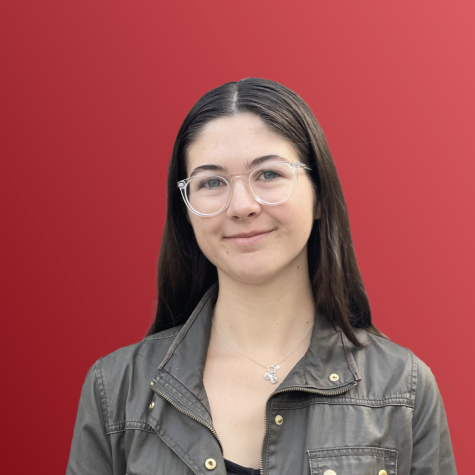
Josie Rozzelle is a senior from San Francisco, CA concentrating in political science with a minor in French. She has previously served as multimedia manager,...


